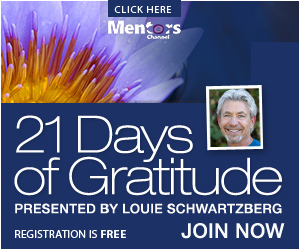The Greater Good Science Center at the University of California, Berkeley, in collaboration with the University of California, Davis, is in the process of launching a three year, scientific project called, Expanding the Science and Practice of Gratitude. Robert Emmons, Professor of Psychology at UC David, is spearheading the work, financed with a $5.6 million grant from the Templeton Foundation. To uncover the far reaching power of gratitude, they will draw conclusions from a range of research studies, awarding grants to participating scholars around the world.
Dr. Emmons has been researching and writing about gratitude for many years. In his first book, Thanks! How Practicing Gratitude Can Make You Happier, Robert Emmons concluded, "Gratitude enriches human life. It elevates, energizes, inspires ad transforms. People are moved, opened and humbled through expressions of gratitude."
Last week, I was stopped at a red light near a fast-food restaurant. I noticed a disheveled looking homeless man, pulling what probably were all his possessions in a small cart. He walked towards the front door, then stopped. A woman who just got out of her car walked over to him and handed him some money. I was close enough to hear the conversation. She said, "How about some lunch?" He replied, "Bless you." As I watched the compassionate act of the woman and the grateful response of the man, tears welled up in my eyes. As Professor Emmons said, I felt moved, opened and humbled through that one expression of gratitude.
But what if gratitude is not something habitual in our lives? Can we learn how to feel grateful and express gratitude? And if so, how long will it take to change a habit we cultivated for years? Dr. Emmons has included one mainstay in all of his research projects. He has asked people to write down each day what they felt grateful for. In his latest book, Gratitude Works! A 21-Day Program for Creating Emotional Prosperity, he wrote about what we could expect from keeping a gratitude journal. "Three weeks was sufficient (time) to lead to significant personal changes. At the end of 21 days you will feel yourself energized, inspired, and motivated further to make these practices a regular part of your life."
What if there were a way you could not only keep a gratitude journal, but hear inspirational thoughts and watch stunning images about gratitude, for 21 days. And what if this program was available to you online. Mentors Channel, along with award-winning filmmaker Louie Schwartzberg, is offering this opportunity for you, free of charge, for three weeks. You have nothing to lose and everything to gain. Gratitude can change your life. Gratitude can change the world.
For more by Dr. Marcia Hootman, click here.
For more on meditation, click here.
